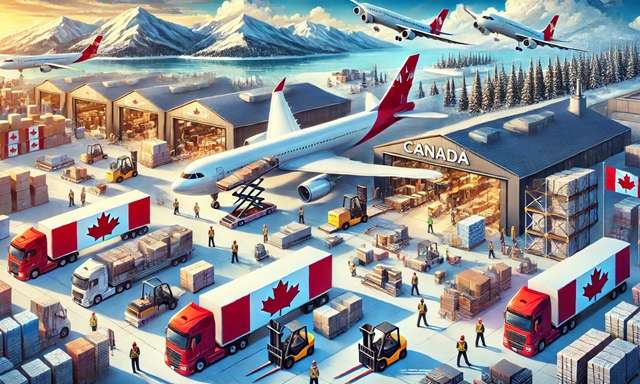Air Cargo Transport and Freight Forwarding Operations in Canada
Air cargo transport and freight forwarding play a vital role in Canada’s economy, connecting businesses with global markets and facilitating the movement of goods across vast distances. As a country with a diverse range of industries—from manufacturing to agriculture—and a strong export-driven economy, efficient logistics operations are critical to maintaining Canada’s competitive edge. This article explores the key aspects of air cargo transport and freight forwarding operations in Canada, shedding light on the opportunities, challenges, and emerging trends shaping the sector.
The Importance of Air Cargo Transport in Canada
Canada’s geography presents unique logistical challenges. With its expansive landmass, remote communities, and large distances between urban centers, air cargo transport is often the most efficient and reliable method for moving goods. Air cargo accounts for a significant portion of high-value, time-sensitive shipments such as pharmaceuticals, electronics, and perishable goods. Major airports such as Toronto Pearson International Airport, Vancouver International Airport, and Calgary International Airport serve as key hubs for air cargo operations. These facilities are equipped with advanced infrastructure to handle diverse cargo types, including temperature-controlled storage for perishables and secure areas for high-value goods.
Freight Forwarding Operations: The Backbone of Global Trade
Freight forwarders act as intermediaries between shippers and transportation services, ensuring smooth and efficient logistics operations. In Canada, freight forwarding is a well-established industry that supports both domestic and international trade. Companies in this sector provide a range of services that include managing customs regulations and documentation requirements, combining smaller shipments into single cargo loads to reduce costs, and offering multimodal solutions to optimize delivery routes. Freight forwarders also play a critical role in managing risks such as cargo damage, delays, and compliance issues, ensuring goods reach their destination securely and on time.

Challenges in Air Cargo and Freight Forwarding
Despite its importance, the air cargo and freight forwarding industry in Canada faces numerous challenges. Regulatory compliance is one of the major hurdles, as adhering to Canada’s stringent aviation and trade regulations can be complex and time-consuming. Infrastructure limitations also pose a significant challenge; while major airports are well-equipped, smaller regional airports often lack the facilities needed to support large-scale cargo operations. Additionally, the aviation industry is under increasing pressure to reduce its carbon footprint, prompting airlines and freight forwarders to adopt sustainable practices to align with Canada’s environmental goals.
Global disruptions, such as the COVID-19 pandemic and geopolitical tensions, have highlighted vulnerabilities in global supply chains, affecting both air cargo and freight forwarding operations. Rising operational costs due to factors like increasing fuel prices, labor shortages, and higher demand for expedited shipping further exacerbate these challenges. Smaller players in the industry often struggle to adopt advanced technologies due to limited resources or expertise, creating technological barriers. Moreover, Canada’s harsh winters and unpredictable weather frequently disrupt air cargo schedules, leading to delays and additional costs for freight forwarders.
Air Cargo in 2024: A Year of Growth and Resilience in Canada and Beyond
In 2024, Canada’s air cargo sector demonstrated notable activity. In the first quarter, Canadian airlines reported $522.3 million in cargo revenue, which constituted 6.3% of their total operating revenue. This figure increased in the second quarter, with cargo revenue reaching $560.1 million. Additionally, during the second quarter, Canadian carriers transported 217.0 million tonnes of goods, marking the highest volume for a second quarter since 2016. On a global scale, the air cargo industry experienced consistent growth throughout 2024. In October, the International Air Transport Association (IATA) reported a 9.8% year-over-year increase in total demand, measured in cargo tonne-kilometers (CTKs) (Statistics Canada). This upward trend continued into November, with an 8.2% year-over-year growth in demand. Capacity, measured in available cargo tonne-kilometers (ACTKs), also expanded, reaching record highs for ten consecutive months in 2024. These statistics highlight the dynamic nature of the air cargo industry in 2024, both within Canada and globally, reflecting its critical role in facilitating international trade and economic activity (IATA).
Emerging Trends in the Industry
The air cargo and freight forwarding sector in Canada is evolving rapidly, driven by technological advancements and shifting market demands. The adoption of digital tools, such as electronic airway bills, tracking systems, and data analytics, is streamlining operations and improving transparency. The rise of e-commerce has significantly increased demand for fast and reliable air cargo services, particularly for last-mile delivery solutions. Airlines and freight forwarders are investing in sustainable practices, including fuel-efficient aircraft and carbon offset programs, to reduce environmental impact. Innovations like automated cargo handling systems and drones are also improving efficiency and reducing operational costs, helping companies remain competitive.
Opportunities for Growth
Canada’s strategic location and trade agreements, including the Canada-United States-Mexico Agreement (CUSMA), position the country as a key player in global trade. The expansion of trade with Asia-Pacific nations and the growth of emerging markets present significant opportunities for the air cargo and freight forwarding industry. Government initiatives to enhance infrastructure, such as the National Trade Corridors Fund, aim to improve connectivity and efficiency in Canada’s transportation network. These investments are expected to address some of the industry’s current challenges and support future growth.
Conclusion
Air cargo transport and freight forwarding are indispensable to Canada’s economy, enabling businesses to compete in the global marketplace. The industry encounters challenges such as regulatory compliance, infrastructure limitations, and environmental concerns, but digitalization, e-commerce, and government support are driving its growth. By embracing innovation and sustainability, Canada’s air cargo and freight forwarding sector can continue to thrive in an increasingly interconnected world. For businesses looking to leverage the benefits of air cargo and freight forwarding, partnering with experienced and reliable service providers is essential. With the right strategies and solutions, companies can navigate the complexities of global trade and achieve long-term success.


